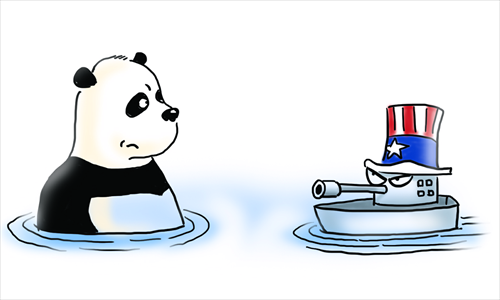US provocations serve multiple purposes

Illustration: Shen Lan/GT
On Saturday, the guided missile destroyer USS Curtis Wilbur sailed within 12 nautical miles of the Chinese territorial waters around the Xisha Islands without permission and Chinese troops stationed at the islands and naval ships took immediate action. The two sides didn't clash, but no one can be assured that they would always be lucky in this way.
Previously, the Chinese and US sides had conflicts mainly over the Nansha Islands, but this time US military made provocations in the waters around the Xisha Islands. China's Law on the Territorial Sea and the Contiguous Zone, enacted in 1992, stipulates that foreign military ships need the approval of the Chinese government to enter China's territorial waters. This article conforms to the international law and practices and many countries have similar articles.
The US hasn't ratified the UN Convention on the Law of the Sea (UNCLOS). But the maritime hegemon has been abusing its right of innocent passage, which allows for a foreign vessel to pass through the territorial waters of a littoral state so long as it is not prejudicial to the peace, good order or security in the coastal state. But as Oppenheim's International Law admits, the right of innocent passage by foreign warships is not universally recognized. As an unrivaled maritime power, the US can interpret the international law in accordance with its own interests and political needs and choose to ratify UNCLOS or not.
The US flexes its muscles against China at this time for some purposes. The US-ASEAN Summit is to be held in mid-February at the Sunnylands in California. It is where Chinese President Xi Jinping met with his US counterpart Barack Obama in June 2013 and put forward the principles of a new type of major power relationship, which include no conflict, no confrontation, mutual respect and win-win cooperation. But the US may believe that it is expected by ASEAN nations to confront China. Shortly before Obama departed for Malaysia to attend the East Asia Summit in November, the USS Lassen illegally entered the waters near China's Nansha Islands in late October. The East Asia Summit was initiated by ASEAN to be a platform for discussing about nontraditional security cooperation. Yet it has been turned largely by the US into a venue for sensitive political topics like territorial disputes. ASEAN undoubtedly doesn't want the regional institution to become a tool of big powers.
Last year, US Secretary of Defense Ashton Carter put forward the Southeast Asia Maritime Security Initiative that costs $425 million, most of which will be used to fund some countries in arms acquisition. It's reported that the navies of the US, Japan and Australia will hold joint military exercises in the South China Sea for the first time in February. The increase in the US-led military moves in Asian waters leads to growing uneasiness of Beijing.
Apparently Washington has deliberately ignored Beijing's wisdom and capabilities in dealing with territorial issues. China's two-way trade volume with its important neighbor Vietnam has exceeded $90 billion and China has been the latter's largest trading partner for 11 years in a row. In Vietnam's latest leadership election, Nguyen Phu Trong, who advocates friendly ties with China, was re-elected as the secretary general of the Communist Party of Vietnam. This may disappoint the US.
China and Vietnam have addressed the delineation of the land border and the Beibu Gulf through consultations and are working jointly to develop the waters outside the mouth of the Beibu Gulf. During his visit to Vietnam in November, Xi proposed that on maritime issues the two sides should seek a basic and long-standing solution acceptable to both sides. His visit was considered an attempt to heal the rifts in China-Vietnam ties and showed China's will to stick to the approach of peaceful consultations.
What concerns Chinese analysts is how much grip the White House has on the US military. Admiral Harry Harris, head of US Pacific Command, recently said that his personal view is that "those islands (in the South China Sea) do not belong to China." Such irresponsible remarks by a senior military official carry high risks.
Many pundits believe that the deterioration of the Ukraine crisis that put the US and Russia at odds originated largely from the aggressive and blind actions by Victoria Nuland, assistant secretary of state. It remains a question whether the US-China relationship will be exacerbated due to the lack of control of the US military by the White House.
The author is a research fellow at the Charhar Institute and an adjunct fellow at the Chongyang Institute for Financial Studies at Renmin University of China. opinion@globaltimes.com.cn